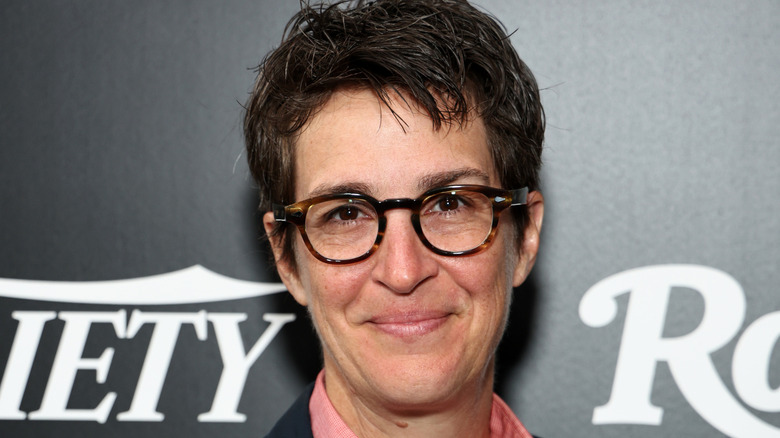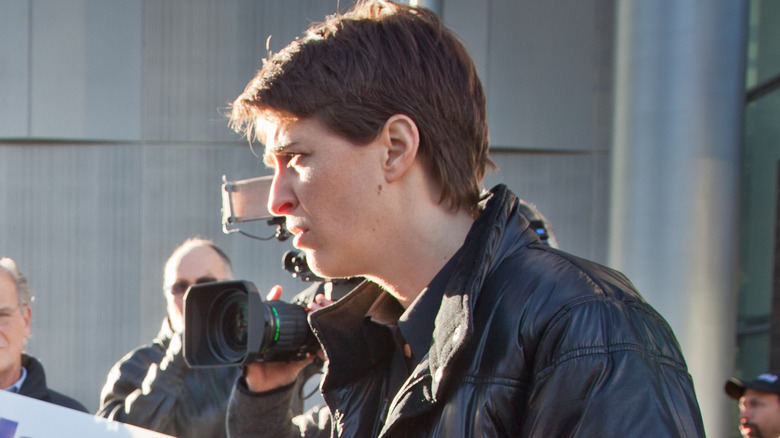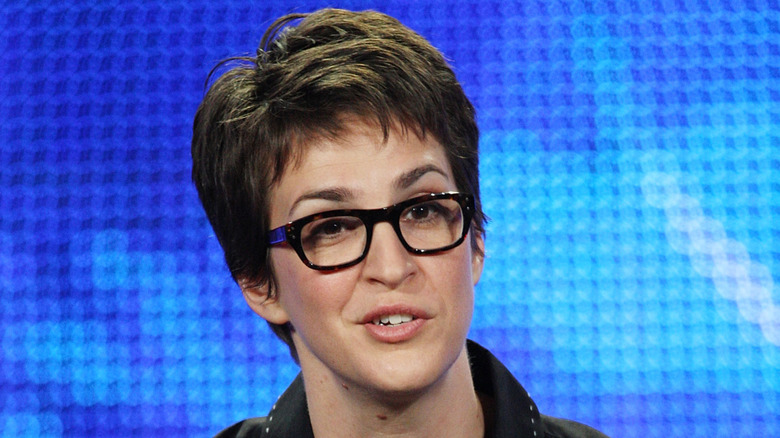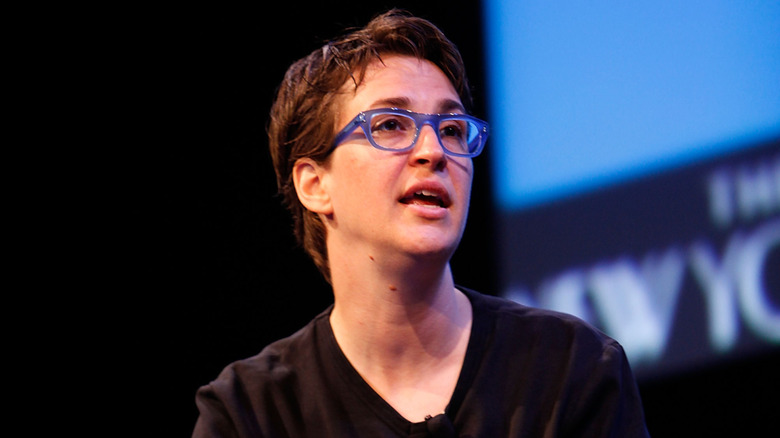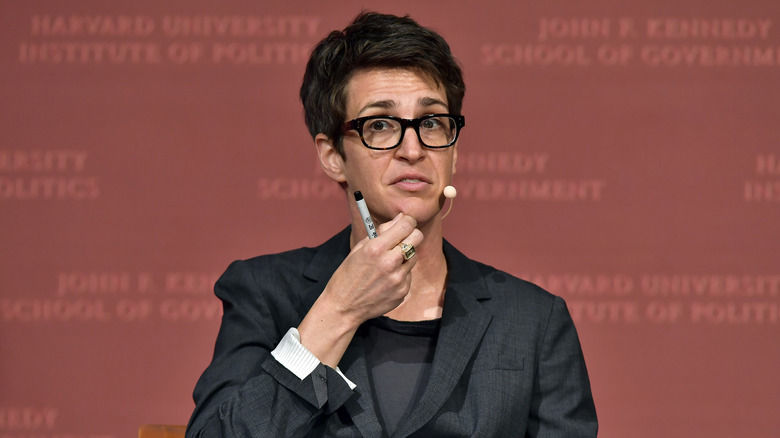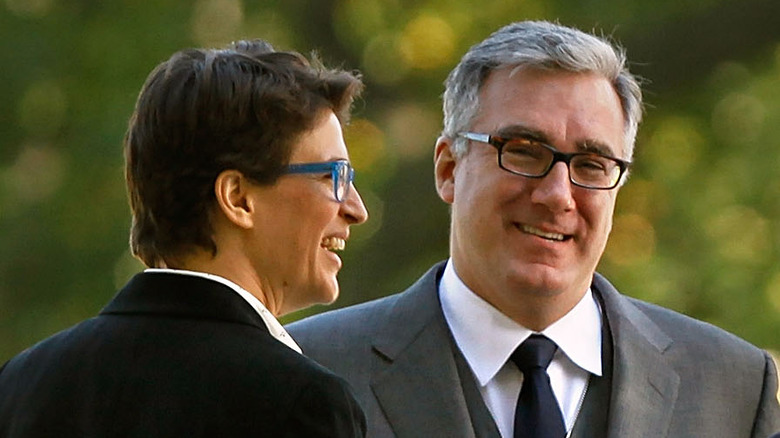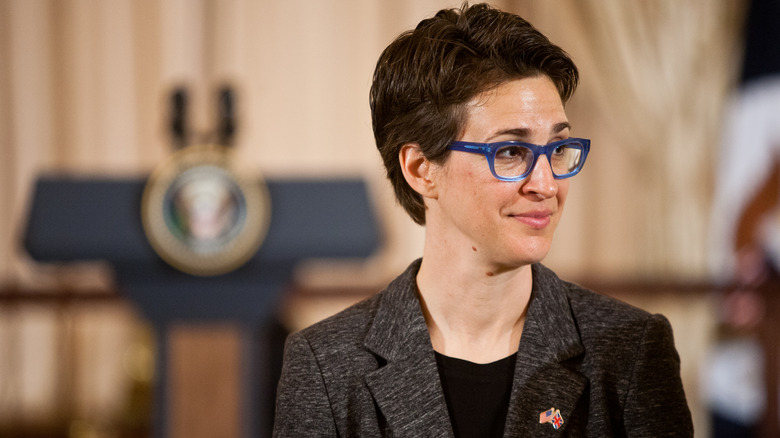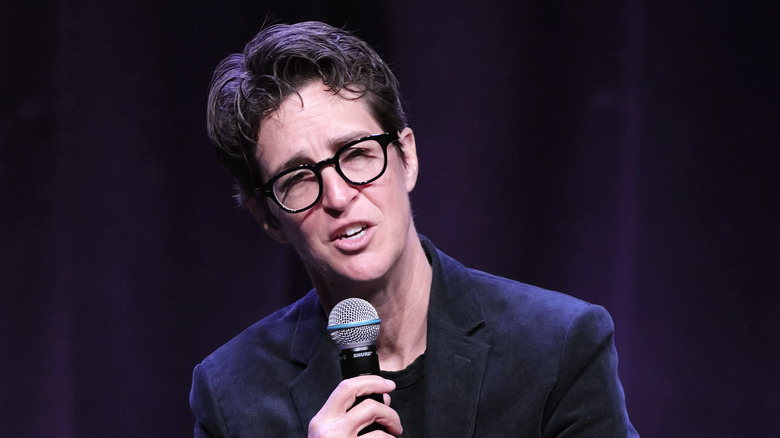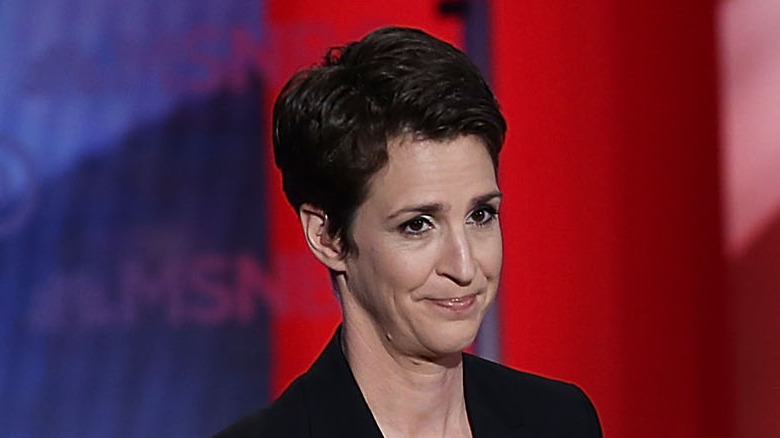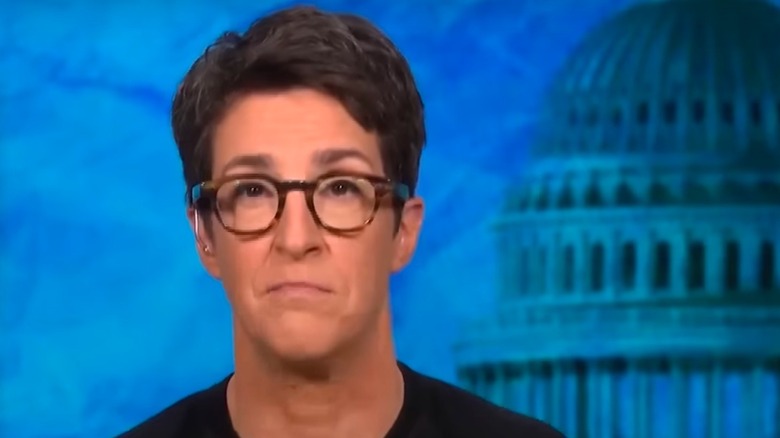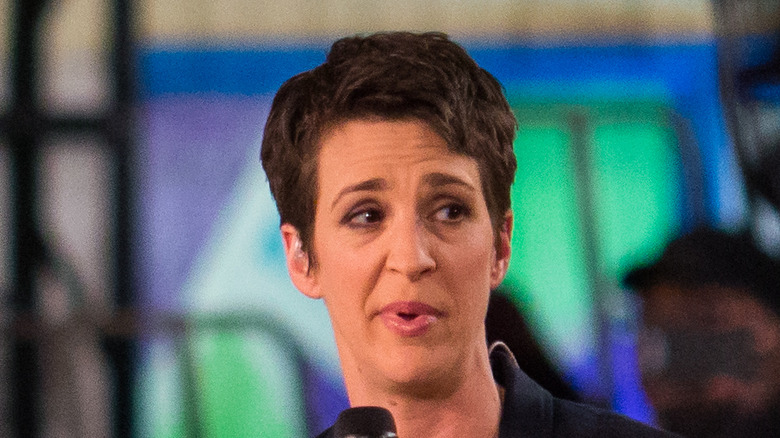The Tragic Details Of Rachel Maddow
Rachel Maddow's ascent to the top of television cable news has been as meteoric as it's been unexpected. After all, not only is Maddow openly gay, she's also, technically speaking, not a journalist. A Rhodes scholar with a degree in public policy from Stanford, and a doctorate in political science from Oxford, Maddow was seemingly on track to make her mark on academia. Everything changed, however, when a spontaneous decision to audition for a morning radio show opened the door to a whole new — and thoroughly unexpected — career in the media.
Her innate ability at radio led her to the now-defunct Air America, where she honed her on-air skills. That eventually provided the opportunity to segue into television, a medium at which she proved to be even more adept. After a stint as a talking head on Tucker Carlson's MSNBC show, she began filling in for host Keith Olbermann before eventually being tapped to take over his time slot with her own show when he departed. In the decade-plus since then, Maddow has become the linchpin of MSNBC's programming, building a respected brand that's seen her branch out with bestselling books, hit podcasts, and even a movie deal with no less than Steven Spielberg himself.
Despite all of the success she's experienced, it has been tempered by pain, sadness, damaged relationships, and other tragic circumstances.
A devastating injury quashed her promise as an athlete
Growing up on the outskirts of San Francisco, Rachel Maddow straddled the seemingly polar opposite worlds of jocks and nerds. A brilliant student with exceptional grades, Maddow was also a talented athlete who excelled at a variety of high school sports, including swimming, basketball, and volleyball. It was in the latter that she demonstrated the most ability. Not only was she hopeful she'd landed a volleyball scholarship, but she even dreamed she'd go on to represent her country at the Olympic games.
All those hopes and aspirations came crumbling down in her senior year of high school when she suffered a serious injury to her shoulder during a game of volleyball. "When I hurt my shoulder, I had to decide whether to get it fixed so I could go on being an athlete, or not," Maddow revealed in a 2017 interview with The New Yorker. According to Maddow, while her injury was such that it would hamper her future in volleyball, it wouldn't hinder her everyday life.
This led to a conundrum: Undergoing surgery could revive her dreams of an athletic scholarship and possible Olympic glory, but it would also delay her plans to attend college for a full year. She decided to forgo surgery, closing the door on what had been a promising future as an athlete. "I graduated from the local high school at seventeen and went to Stanford," she said.
She was outed to her conservative parents by her college newspaper
While Rachel Maddow's sexuality is far from an issue these days, American society wasn't always so accepting of homosexuality. When Maddow was a teenager and came to understand that she was gay, she wasn't immediately eager to share the news with her conservative Catholic parents. During her freshman year at Stanford, Maddow came out by putting up posters in her dorm revealing she was a lesbian. That led her and another openly gay student to be interviewed by the college's student newspaper, The Stanford Daily.
There were unintended consequences, however, when someone anonymously sent a copy of that issue to Maddow's parents, letting that particular cat out of the bag. "They would have had a hard time with me coming out anyway, but this was a particularly nasty way for them to find out," Maddow told Newsweek, revealing they did not take the news well at all, at least not initially. "They were shocked and upset and hurt," she said, reflecting on the pain that she'd unintentionally inflicted on her parents. "First of all, they were having to deal with the fact that I'm gay," she continued. "Second of all, they were having to deal with the fact that I'm gay in the newspaper. And third of all, they were having to deal with the fact that they've raised some sort of horrific, callous rug rat who would tell the student paper before telling her family."
There was a 'rift' with her parents as they struggled to accept her sexuality
Before The Stanford Daily's story about Rachel Maddow made its way to her parents, Maddow believed she'd have enough time to come out on her own terms. Sadly, that didn't happen, and her relationship with her parents grew difficult. "It was very hard for them. My mom is very Catholic, and my dad saw how much it hurt my mom," Maddow recalled in her interview with The New Yorker, describing the ensuing situation as "a temporary rift."
While that rift may not have been permanent, it was certainly not brief. "What happened was that they ended up publishing the article early before she had told her parents and her parents were just extremely hurt and distraught and their relationship wasn't great for a good number of years," Maddow's biographer, Lisa Rogak, told The Seattle Lesbian.
However, as proof of that old adage about time healing all wounds, Maddow and her parents eventually healed their strained relationship. "They're wonderful now, and couldn't be more supportive, but they took it poorly at first, which I don't fault them for," Maddow told Newsweek, conceding that she'd made a mistake by not telling them before sharing the news with a media outlet. "But now my parents and I are close again," she told The New Yorker. "They couldn't be more supportive."
Rachel Maddow became an AIDS activist, fearing her 'community would not exist in the future'
After injuring her shoulder during her senior year of high school, Rachel Maddow found herself with time on her hands now that she was no longer able to play sports while recuperating. At that same time, in the early 1990s, she was coming to terms with her own sexuality, and had become acutely aware of the devastation that the AIDS crisis had unleashed in San Francisco. "I understood that there was [a] chance (because of AIDS) that my community would not exist in the future," Maddow told SF Gate. Feeling a grave sense of responsibility, she began to secretly volunteer at an Oakland AIDS clinic — while her parents were none the wiser.
Those early experiences as a teenager impacted her deeply, propelling her on a lifelong mission as an AIDS activist. As she revealed to The New Yorker, "We were taking this overwhelming, maddening, depressing, very sad thing that my community and my city were going through and figuring out what pieces of it we could bite off and fix, finding winnable fights in something that felt like a morass and was terrible."
Maddow always approached activism as a problem to be solved. She told POZ, "Activism is figuring out that there is something that you want to be changed in the world. ... Whatever it is. And then you figure out what would need to happen in the world so that change would occur."
A schism formed between Rachel Maddow and one-time mentor Keith Olbermann
It's not hyperbole to suggest that other than herself, no single person is more responsible for Rachel Maddow's broadcasting success as Keith Olbermann. Olbermann, who'd spent the first part of career in sports, was arguably MSNBC's most popular figures at the time that Rachel Maddow came to the cable news network in 2005. Initially appearing as a panelist on the MSNBC show hosted by future, and now former, Fox News firebrand Tucker Carlson, she also began appearing on "Countdown with Keith Olbermann."
Olbermann proved to be an excellent judge of talent and could see the value that Maddow brought to his show. He ultimately became Maddow's mentor and biggest booster, convincing MSNBC brass to give Maddow a shot at filling in for him on "Countdown" when he was on vacation. "She's terrific," Olbermann told the The Kansas City Star in 2008. "Wonderfully informed, totally prepared, forceful and yet respectful." When Olbermann wound up abruptly parting ways with MSNBC in 2011, reportedly resulting from years of tension with his network bosses, Maddow took over his time slot with her own show.
Years later, the relationship between Olbermann and his one-time protégée had apparently soured. When Maddow announced some massive changes to her talk show — including reducing her on-air presence to just once a week — Olbermann revealed that he'd been in the running to take over the show when she wasn't there. However, he told The Daily Beast, that deal had been squelched by none other than Maddow herself. "I offered to have her production company 'produce 'the show. Would give her some proxy control and a f***ton of money but she and [former MSNBC chief-turned-consultant to Maddow's production company] Phil Griffin refused," he said.
Although she can take it, she has endured plenty of 'hatred' from critics
While it's fair to say that Rachel Maddow has attracted legions of fans over the years, she's also become a somewhat polarizing figure in the left-versus-right narrative that's come to frame the American political landscape. As a result, the appreciation she experiences from her admirers has tended to be in direct proportion to the scorn that she's experienced from her detractors — particularly supporters of real estate mogul-turned-president Donald Trump.
That said, Maddow has been in the public eye long enough to develop a thick skin, and she has developed the ability to let disparagement from the right slide right off. "I don't care what anybody says about me. I don't play requests and I don't worry about the criticism," she told The Guardian. That, however, is not to say that she won't take responsibility for messing up. "If we get something wrong, I'll correct it," she added, "but, in the absence of that, the criticism for focusing on real news stories that bother people — that's what I get paid to do."
Of course, there's criticism and then there's downright antipathy — something she deals all the time and has learned to use as a sort of fuel. "Bring it," she tauntingly added. "Your hatred makes me stronger. Come on. Give me more. Give me more. I love it!"
She was the victim of a fake news video that maligned her
In late 2024, Rachel Maddow found herself at the center of a controversy — that she actually had nothing to do with. It all began when Elon Musk — aka "first buddy" of President-elect Donald Trump — and Trump's progeny, Donald Trump Jr., jokingly suggested that Musk purchase MSNBC. That was met with a video that began making the rounds on Musk's X (formerly Twitter), in which Maddow is seen breaking down in tears during a broadcast, apparently due to a graphic of Musk's tweet about buying the cable news network.
There was one rather significant problem with that video, however: It was completely bogus. As Reuters pointed out, the footage of Maddow becoming overcome by emotion was from an episode of "The Rachel Maddow Show" in which she was reporting on the "zero-tolerance" immigration policy of separating and detaining babies and children from migrant parents that was enacted during the first Trump administration. "I can confirm that the video that is circulating has been manufactured and is fake," a spokesperson for MSNBC told Reuters via email.
She was diagnosed with skin cancer
Rachel Maddow doesn't often share much about her personal life with viewers, but she made a rare exception during a 2021 episode of "The Rachel Maddow Show." As Maddow explained, she and longtime partner Susan Mikula were attending a softball game when Mikula noticed that a mole on Maddow's neck appeared to have changed. While Maddow brushed it off, Mikula was adamant that she see a doctor and get it checked out.
She did, and her dermatologist agreed with Mikula, believing a biopsy was warranted. When the results came back, Maddow was hit with a bombshell diagnosis: The mole was cancerous. Maddow underwent surgery to have the mole removed and was later given a clean bill of health.
As a result, Maddow told her viewers to get these sorts of health screenings, explaining that the only reason she was is cancer-free is because she addressed the issue quickly. "Schedule a check now with your doctor," Maddow said, cautioning viewers who may have also noticed changes in moles. "It's only by the grace of Susan that I found mine in enough time that it was totally treatable because I had been blowing off my appointments forever to get stuff like that checked because I assumed it will always be fine."
She's had a life-long struggle with depression
To viewers of her MSNBC show, Rachel Maddow usually appears upbeat, quick to offer a joke when warranted. However, that onscreen persona belies the fact that Maddow has experienced regular struggles with dark depression. "It's manageable. But it's real," she revealed during a 2012 appearance on NPR's "Fresh Air."
Her experiences with depression, she told The New Yorker, were not something she'd been comfortable discussing publicly, at least not early in her career. "Because it is nobody's business," she declared. However, she also came to realize how meaningful it had been in her own struggle to hear that those she admired had also endured bouts of depression. "But it had been helpful to me to learn about the people who were surviving, were leading good lives, even though they were dealing with depression. So I felt it was a bit of a responsibility to pay that back," she added.
During a 2019 on the "WTF with Marc Maron" podcast, Maddow admitted that while her depression wasn't constant, it could become severe. "And when it happens, I sort of lose the will to live," she said, as reported by Today.com. "Nothing has any meaning." According to Maddow, she's resisted seeking treatment via pharmaceuticals and has utilized other methods. "There are things that are good for me,” she explained. "Exercise is good for me."
She becomes highly self-critical after a show she deems to be just so-so
Rachel Maddow may be able to slough off unwarranted criticism of her work, but that becomes far more difficult when those negative assessments come within. In fact, she revealed in a 2012 interview with Rolling Stone, she had yet to encounter a critic as harsh as Maddow herself.
As Maddow explained, she's self-aware enough to know that she won't hit it out of the park every night — and that whenever she does, it only makes the times she doesn't that much more difficult to endure. "Like, doesn't get any worse," she said of a show that she felt didn't hit the mark she'd set. "I've been doing this for four years! Why do I still have one-star shows? It's me — failure," she added.
When asked why she insists on being so self-critical, she offered a wry but telling response. "My reaction to that is to say, 'Oh, another bad thing about myself is that I've allowed you to see that I'm hard on myself,'" she said. "The fact that you're seeing me sweat is like, 'Ah, well, I'm failing on that, too.'"
Health concerns forced her to cut back on her workload
Given her background in academia, it shouldn't be surprising that Rachel Maddow has a reputation for preparing for her shows like a student cramming for a final exam. Over the course of years and years, working five nights a week, that level of commitment led to Maddow's impressive net worth — but it also wound up taking a toll, which ultimately weighed on her decision to step back. Maddow changed her MSNBC schedule to appear on "The Rachel Maddow Show" solely on Mondays while shifting her focus to podcasts and other projects.
"I knew that I needed to make the change for me just in terms of my health," Maddow revealed during a 2022 appearance on "Fresh Air." As she explained, the stress she'd been putting herself under had manifested itself in symptoms that weren't just mental but physical as well. "I've had a lot of back trouble over the last five years, and that is something that I've mediated a little bit through physical therapy. ... But bottom line, that's about working, you know, 10 to 12 hours a day, five days a week, 50 weeks a year for more than 12 or 13 years," she said.
Even for someone with such a savage work ethic, she could no longer ignore the increasing signs that the time had come to dial things back a bit. "I mean ... there's a bottom line there that I knew I needed to make some kind of change," Maddow added.
